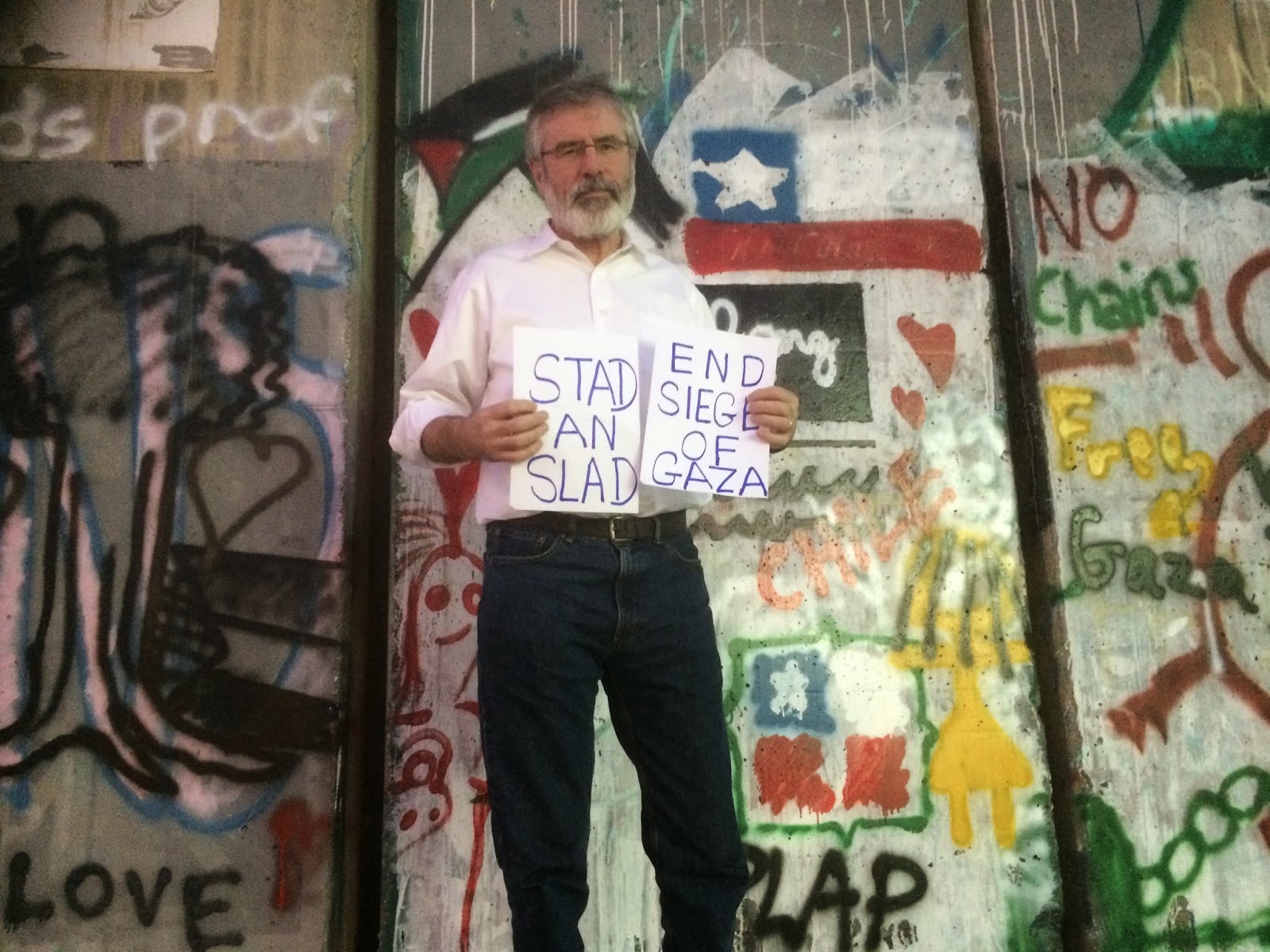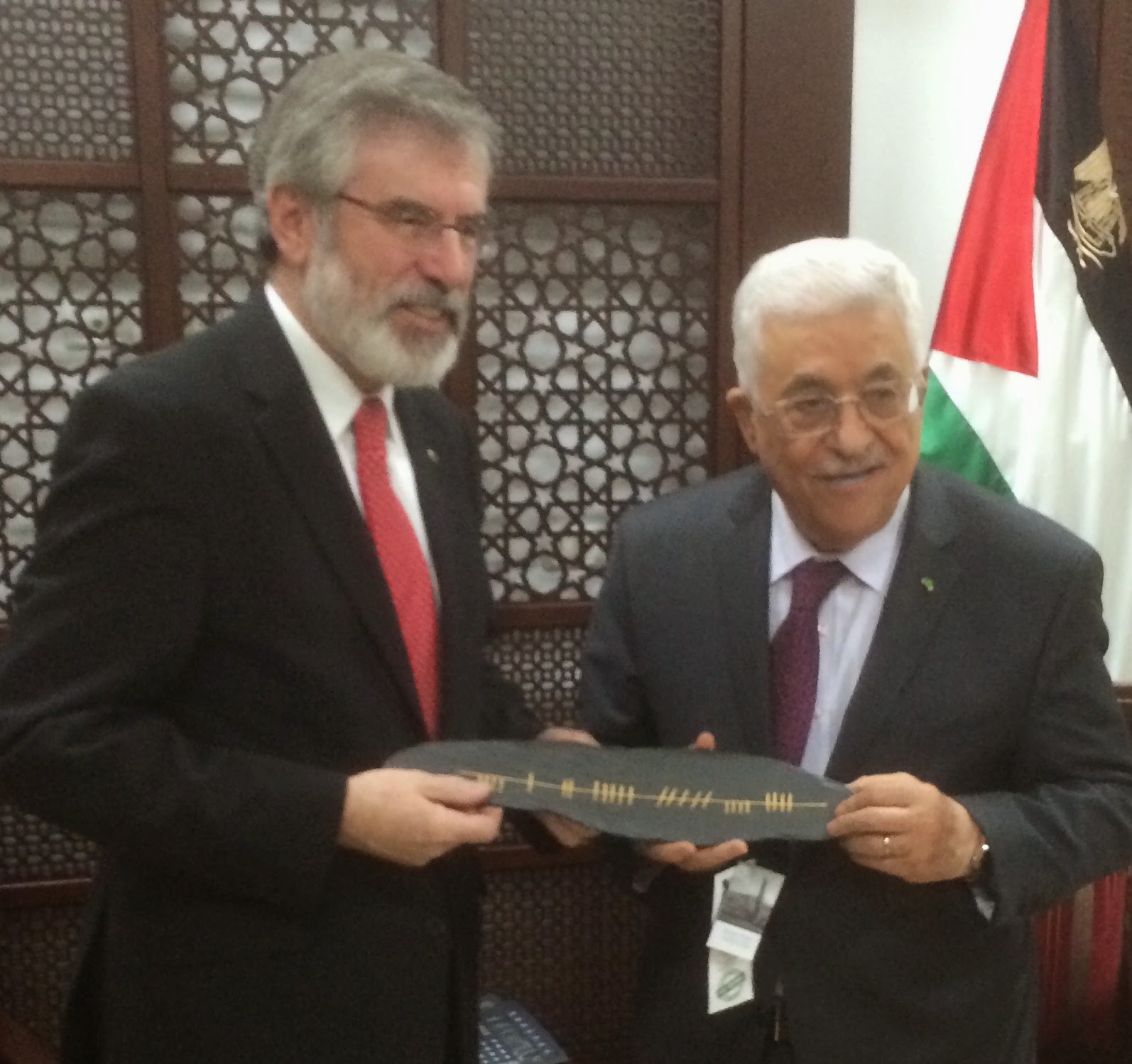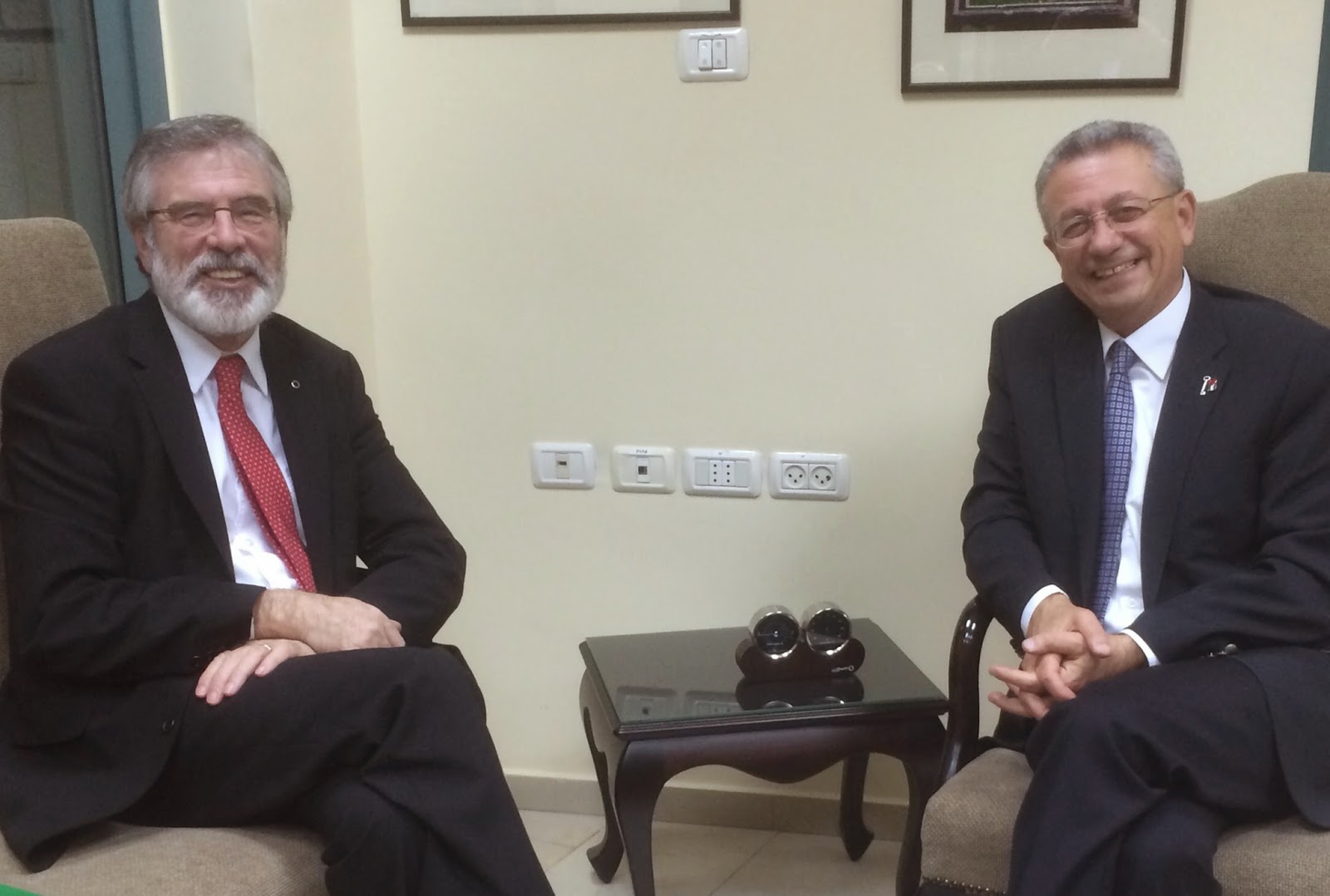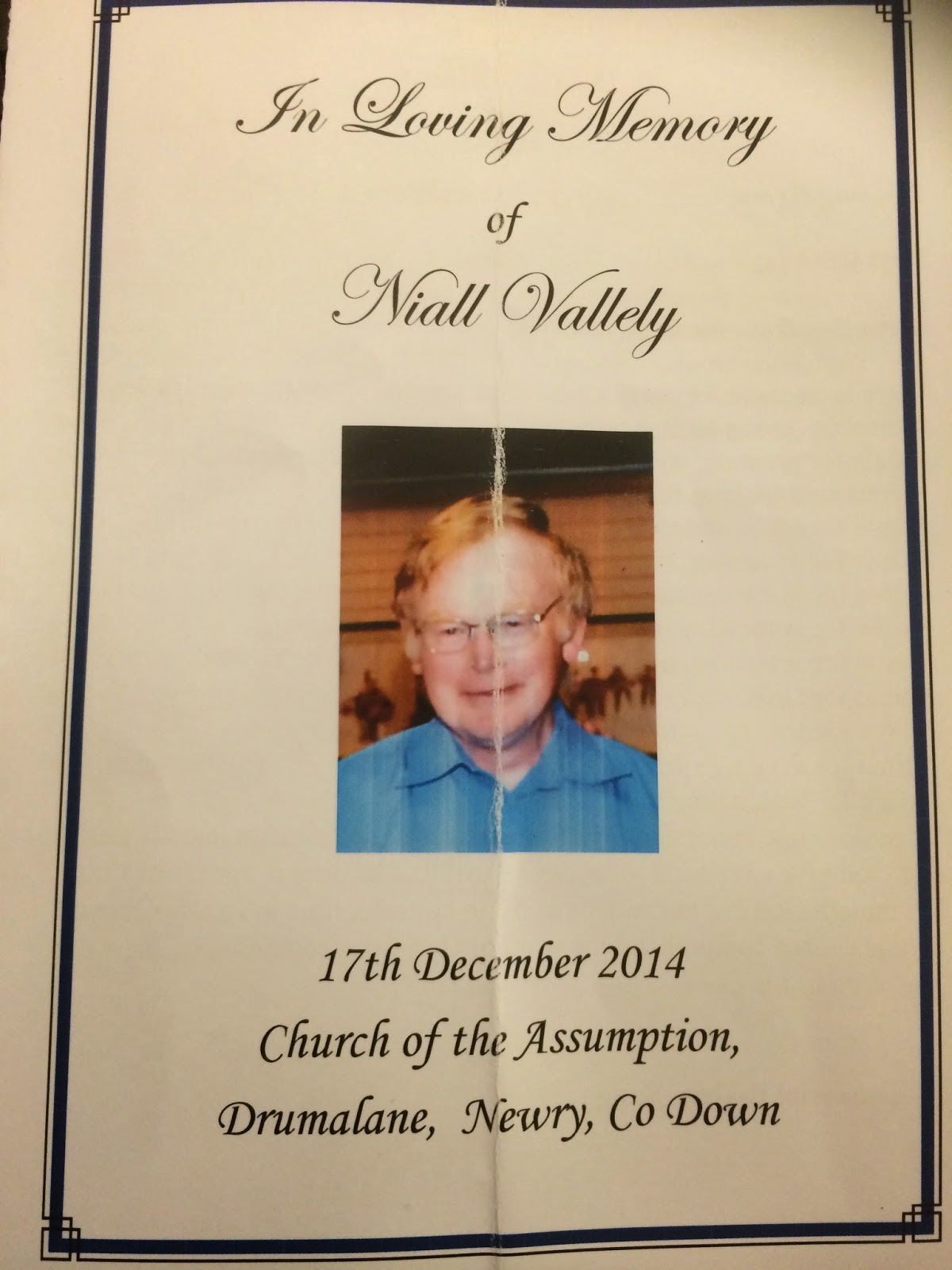Niall Vallely died on Sunday. His funeral took place in Newry this morning and I was asked to give a eulogy during the mass which I was honoured to do.
Below are my remarks:
Niall Vallely – an idealist, an activist, a family man, a musician
Bhí idir iontas agus bhrón mór orm nuair a tháinig scéala chugam fá bhás Niall.
Ba mhaith liom mo chomhbhrón a dhéanamh le teaglach Vallely ag an uair millteanach brónach i saol bhur gclann.
Is mór an ónór domhsa a bheith ag caint faoi Niall inniu.
He had a special place in his heart for his ‘three girls,’ Saoirse, Maebh and Roisin.And I am sure you will all miss him enormously.Niall was full of craic and fun and life.He had a boundless energy; an openness and warmth that made him instantly likeable.And he loved politics.
And in so many campaigns over the years he was an activist; handing out leaflets, talking to people on the doorstep or outside the shopping centre, writing letters to the newspapers, articles for local news sheets, speeches for candidates and for himself.
He was a regular contributor at the Ard Fheis.
His contribution in the debate on policing at the Special Ard Fheis in 2007 is fondly remembered.
The chair had the devil of a time trying to get him to stop talking!
Like many of you I knew Niall for a very long time.
I knew him both personally and politically.
We were both active in the Civil Rights movement in the 1960s.
At that time people from across the political spectrum came together to demand basic human and civil rights for nationalists.
This included many republicans, socialists, communists, liberals, trade unionists, community activists, students and others, including initially some unionists.
Niall was a member of People’s Democracy.
I was in Sinn Féin.
The Civil Rights campaign shaped both of our lives and the lives of many of our contemporaries.
The Armagh branch of People’s Democracy was generally regarded as its most militant.
Not surprisingly Niall was its spokesperson.
In May 1969 a small group of pensioners and PD members held a silent picket outside Armagh Rural Council monthly meeting.
Niall addressed the Council demanding the immediate rehousing of the residents of Mill Row and Lislea.
Angry at the Council’s failure to respond positively Niall and his colleagues returned two weeks later.
This time they were refused permission to speak.
Not an instruction Niall was ever likely to heed.
He and four others were arrested on charges of disorderly behaviour and the Council imposed a ban on public attendance of its meetings.
A few months later August 69 was a particular tipping point for the civil rights movement and for the north.
The Orange state and its armed militia’s in the RUC and B Specials reacted violently against the reasonable Civil Rights demands for – in the sexist language of the day - one man, one vote; the removal of gerrymandered election boundaries; laws against discrimination by local government; the allocation of housing on a point system; the repeal of the Special Powers Act and the disbandment of the B Specials.
One consequence of this was the death in Armagh of John Gallagher following a civil rights demonstration.
This event had a particularly deep impact on Niall.
Niall had organised the civil rights meeting.
Following it B Specials opened fire shooting John Gallagher in the back and wounding two others.
John Gallagher was a father of three.
The B Specials all claimed not to have fired but this was dismissed by the Scarman Tribunal which concluded that the B Specials had ‘no justification for firing into the crowd.’
Through all of what was to come the deep sense of injustice, pain and anger he felt from the murder of John Gallagher never left him.
Niall was enormously likeable and entertaining and insightful about Irish culture, language and republicanism.
Coming so quickly after the death of his beloved wife Úna Niall’s death has been a very difficult time for the entire family.
Úna’s death was a huge blow to Niall.
Úna was his soul mate. His one true love.
I never got to Úna’s funeral but I phoned Niall. He appreciated that very much.
We met a short time after her death.
It was at a Sinn Féin conference. I went over to commiserate with him and we sat talking amidst the hustle and bustle of that gathering.
I remember very well what he said to me and how all the people all around us talking and bantering and shouting were probably oblivious to our presence.
Don’t believe what they tell you about Irishmen not being able to express their emotions.
Niall was very upfront. “Úna was my life. She was my everything.”
So what do you say to that?
He went on to talk about Eimear and Niall and Ruairíwho were all he said doing well; though he noted that Ruairíwasn’t paid very well by Sinn Féin for his job of modernizing the party’s approach to elections.
Later he sent me a framed print of one of his brother Brian’s paintings which my son liberated.
Niall would have appreciated that.
I want to tell that it is a great honour to speak here today.
Your father and brother, your Daideo was a great man and although he might blush if he heard me saying that he might also agree with a laugh.
To you Eimear, Niall and Ruairí, to Nico; to Niall’s grandchildren Saoirse, Maebh and Roisin, and to his siblings Brian, Dara, Mairé and Lorainne I want to extend my own personal condolences and those of Sinn Féin at your loss.
Niall loved all of you deeply. You know that.
He had a special place in his heart for his ‘three girls,’ Saoirse, Maebh and Roisin.
It is a great blessing to know your grandchildren.
And I am sure you will all miss him enormously.
Niall was full of craic and fun and life.
He had a boundless energy; an openness and warmth that made him instantly likeable.
And he loved politics.
From his time in People’s Democracy, almost half a century ago, through the civil rights movement, to Sinn Féin.
In many ways it’s easy to be a young radical but there is something compelling about older radicals - about those who keep the faith, but who also move with the times and who are relevant in the modern world - that was Niall – an anti-imperialist who lived in the real world.
But Niall was not just a talker.
Niall was an activist.
He lived his politics every day.
He read it every day.
It was in his blood.
In so many campaigns over the years he handed out leaflets, talked to people on the doorstep or outside the shopping centre, wrote letters to the newspapers, articles for local news sheets, and speeches for candidates and for himself.
He was a regular contributor at the Ard Fheis.
His contribution in the debate on policing at the Special Ard Fheis in 2007 is fondly remembered.
The chair had great difficulty in trying to get Niall to stop talking!
He knew the importance of that debate.
And the historic nature of that Ard Fheis.
He had things to say and say them he did, despite running over time.
Like many of you I knew Niall for a very long time.
I knew him both personally and politically.
We were both active in the Civil Rights movement in the 1960s.
At that time people from across the political spectrum came together to demand basic human and civil rights for nationalists.
This included many republicans, socialists, communists, liberals, trade unionists, community activists, students and others, including initially some unionists.
Niall was a member of People’s Democracy.
The Civil Rights campaign shaped both of our lives and the lives of many of our contemporaries.
The Armagh branch of People’s Democracy was generally regarded as its most militant.
Niall was its spokesperson.
In May 1969 a small group of pensioners and PD members held a silent picket outside Armagh Rural Council monthly meeting.
Niall addressed the Council demanding the immediate rehousing of the residents of Mill Row and Lislea.
Angry at the Council’s failure to respond positively Niall and his colleagues returned two weeks later.
This time they were refused permission to speak.
Might as well tell a bird not to sing.
Niall and four others were arrested on charges of disorderly behaviour and the Council imposed a ban on public attendance at its meetings.
A few months later August 69 was a particular tipping point for the civil rights movement and for the north.
One event had a particularly deep impact on Niall.
He and others had organised a civil rights meeting in Armagh in solidarity with people in the Bogside under siege from the RUC and B Specials.
After the Armagh meeting the B Specials opened fire killing John Gallagher, a father of three, and wounded two others.
The B Specials all claimed not to have fired but this was dismissed by the Scarman Tribunal which concluded that the B Specials had ‘no justification for firing into the crowd.’
Through all of what was to come in his life afterwards the deep sense of injustice, pain and anger Niall felt from the murder of John Gallagher never left him.
Niall also told about an incident in Armagh in the early 70’s when he was beaten unconscious by a loyalist mob and his heart stopped and for a few minutes he was dead!
As he told it he was the only man who fought for Ireland – died for Ireland – and came alive again for Ireland!.
Humour was very important to Niall.
He was enormously likeable and entertaining and insightful about Irish culture, language and republicanism.
It is in the nature of things that we often wait until a person is dead before we pay tribute to them.
Let me place firmly on the record the hugely important role that the Vallely family have played in shaping the life of our nation; of their contribution to the creative life of our society; and the revival of our music, particularly the tradition of uillean piping, or in Niall’s case the bodhran.
Bhí grá mór ag Niall don teanga, don cheol agus don slí maireach tála 's againne.
Bhí tuiscint dhoimhin aige ar áit agus ar an pháirt a bhí aige I rud éigin níos mó ná a ré féin.
Is minic finnscéalta, scéaltagaisce seanchas agus uaireanta an fhírinne fite fuaite le chéile chun mórscéal níos leithne a chruthú
Niall was also deeply passionate about history.
For him history wasn’t something dry and dusty.
It was an important part of who he was.
He wanted all of us to share in and celebrate our history.
Niall was a generous, decent, human being.
He was wise. He didn’t take himself seriously.
He believed in equality and inclusiveness in all things.
Bhí léargas aige ar chumhacht na teanga, go háirithe nuair a chuireadh sé gáire ar dhaoine.
He was passionate and enthusiastic in all that he did, but especially about his politics.
He travelled the length and breadth of Ireland helping to get Shinners elected, including this Shinner a few miles down the road in Louth.
He believed in a real republic where citizens would have rights and where ordinary people, the citizens would come first.
He believed in a united Ireland and in a real republic, based on social justice.
He was a proud Armagh man.
Niall was born on August 13th.
According to his brother Brian, his birth came during the annual stream of meteors known as the Perseid meteor shower.
He died on December 14th when the annual Geminids meteor shower, created by another comet, can be seen.
As a mathamatician Niall would have appreciated that.
Niall’s death leaves a great void.
For Sinn Féin in Newry/Armagh; but especially for his family.
He leaves a space that can’t be filled; particularly for Eimear, Niall and Ruairí, for Nico and for Saoirse, Maebh and Roisin, and for his siblings Brian, Dara, Mairé and Lore – Ann.
Saoirse, Maebh and Rosin be proud of your Daideo. And your Maimeo.
Your lives are better because of them.
He was an idealist and a pragmatist whose political views were shaped in but never trapped in the 1960’s.
Born and raised at the zenith of the orange state he knew that the Ireland he has left is a different place – a better place – and that he contributed to this.
Chuir Niall misneach ar dhaoine.
Bhí nasc aige le daoine.
Bhí saol dea-chaite aige.
Ba cheart dúinn uilig é sin a cheiliúradh.
He also contributed to the growth of Irish republicanism and Sinn Féin.
His old friend Cyril Toman sent an email, from Australia, when he heard of Niall’s death.
He summed up our sense of Niall perfectly.
Cyril wrote: ‘Niall was a great man; he had vision, he had courage, he had determination, and he had a sense of humour that enabled him to cut through all the pretence and nonsense he encountered… It may not seem important now, but your brother has had a significant influence on the way Irish people - especially those in the north - imagine themselves. And there are not many men or women you can say that about.
I want to finish with a little poem by Brendan Kennelly. I want to dedicate it to Niall’s family.
Begin
Begin to the loneliness that cannot end
since it perhaps is what makes us begin,
begin to wonder at unknown faces
at crying birds in the sudden rain
at branches stark in the willing sunlight
at seagulls foraging for bread
at couples sharing a sunny secret
alone together while making good.
Though we live in a world that dreams of ending
that always seems about to give in
something that will not acknowledge conclusion
insists that forever begin.
That’s what Niall would expect you to do. That’s what he would expect us to do. To begin all over again.
Thank you Niall for your life, for your love, for your work.











.jpg)
.jpg)
